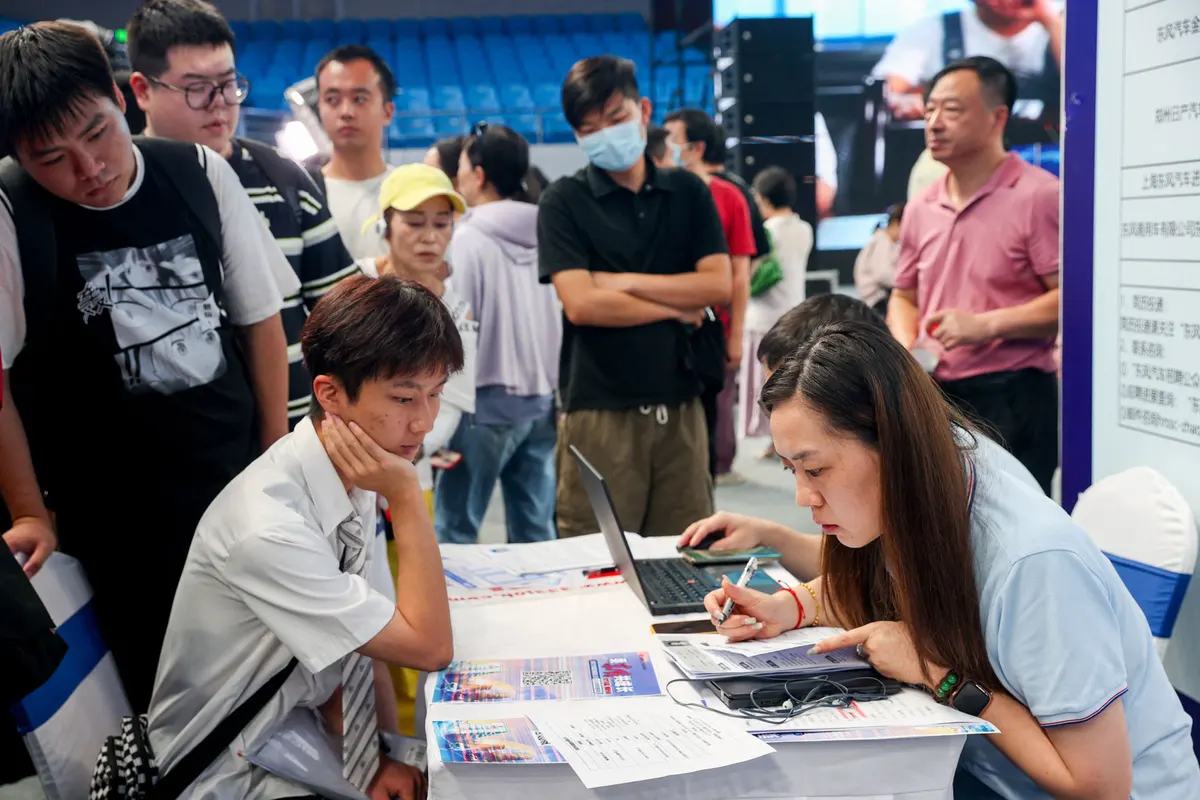China’s Fake Jobs Crisis: Why Gen Z Is Paying to Pretend to Work 🏢
The Reality of Pretending to Work in China 📋
For many young Chinese graduates, a prestigious university degree no longer guarantees a career or even a job interview. In June 2025, China’s youth unemployment rate for ages 16–24 (excluding students) stood at 14.5%, down from a record high of 21.3% in June 2023, yet still alarmingly high by global standards. Some independent estimates suggest the real figure could be higher due to underreporting.
In this challenging environment, a new trend has emerged: “pretend to work” spaces. These are fully equipped offices where jobless Gen Z individuals pay 30 to 50 yuan ($4.20–$7) daily to sit at a desk and simulate a corporate environment. Located in cities like Shanghai, Shenzhen, Nanjing, Wuhan, Chengdu, and Kunming, these spaces offer computers, meeting rooms, Wi-Fi, snacks, and even lunch. Attendees are customers, not employees, seeking structure, community, and a way to reassure their families—or themselves—that they’re staying productive.
Paying to pretend to work isn’t just about maintaining hope; for many, it’s a coping mechanism to combat the psychological strain of prolonged job searches in China’s hypercompetitive and shrinking labor market. 😔
A Real-Life Story: Shui Zhou’s Journey 🧑💼
Shui Zhou, a 30-year-old from Dongguan, turned to a pretend office space after his food business closed in 2024. He pays around 30 yuan ($4.20) daily for a desk, gaining access to computers, fast internet, and sometimes food. Shui arrives at 9 a.m., stays until late, and shares the space with others in similar situations. The faux office provides him with a sense of normality, structure, and camaraderie—a group of “colleagues” who share meals and motivate each other to keep striving for real employment. For Shui and others, this environment fosters discipline and supports mental health, offering benefits beyond simply “pretending.” 🤝
Why Is This Happening? The Roots of the Crisis 🔍
The Chinese job market crisis stems from several factors:
- Overcrowded Workforce: Millions of new graduates enter the job market annually, but the economy struggles to create enough high-skilled jobs. 📈
- Economic Shifts: The transition from export manufacturing to technology and service sectors has made many roles obsolete. 🏭
- Pandemic and Property Crises: These disruptions have further limited job opportunities. 🦠
- Education-Job Mismatch: Companies report a gap between degree programs and market needs, leaving even highly educated graduates struggling. 🎓
- Social Pressures: Urban family expectations make unemployment particularly tough for Gen Z. 😞
For many jobless youth, pretending to work is a temporary safety net, preserving mental health, self-esteem, and routine in a society that highly values diligence and career progress.
China Youth Unemployment Rate Trend (2023–2025) 📊
The chart below illustrates the youth unemployment rate (ages 16–24, excluding students) from June 2023 to June 2025:
Jun 2023: 21.3%
Feb 2025: 16.9%
May 2025: 14.9%
Jun 2025: 14.5%
The Broader Impact and Global Perspective 🌍
While trends like “lying flat” and “rat people” reflect other responses to China’s employment crisis, paying for fake office jobs is a unique symptom of the Gen Z unemployment struggle. It underscores the urgent need for structural reforms in China’s job market and education system. Until meaningful changes occur, many young Chinese may continue pretending to work, holding onto hope for the real opportunities they deserve. 🙏
Frequently Asked Questions ❓
What is China’s youth unemployment rate in 2025? 📅
China’s official youth unemployment rate (ages 16–24, excluding students) is 14.5% as of June 2025.
What are “fake office jobs” in China? 🖥️
Fake office jobs refer to commercial workspaces where young people pay to simulate an office environment, helping them maintain routine and morale amid unemployment.
Why is Gen Z unemployment so high in China? 📉
High unemployment is driven by economic shifts, education-job mismatches, a slowing economy, and intense competition for limited high-skilled jobs.
How much do Chinese youth pay for pretend office jobs? 💸
They pay around 30 to 50 yuan per day (about $4.20–$7), reflecting their need for structure and community.
Are the fake offices real companies? 🏢
No, fake offices are commercial setups providing workspaces, not actual employers. Users pay for access and community, not a salary.
Who benefits from fake office jobs in China? 👥
Primarily unemployed Gen Z individuals seeking discipline, community, and a sense of purpose during job searches.
Where are these fake office jobs most popular? 🌆
They are popular in large Chinese cities like Shanghai, Shenzhen, Wuhan, Nanjing, Kunming, and Chengdu.
What psychological impact does pretending to work have? 🧠
It reduces anxiety and boosts motivation for many, but also highlights a broader crisis in self-worth and social trust.
What is being done to tackle the Chinese job market crisis? 🛠️
The Chinese government has launched policies like increased unemployment insurance refunds and job creation programs, but challenges persist.
Can this trend be seen in other countries? 🌐
While co-working spaces exist globally, paying to pretend to work is a unique response to the specific pressures of China’s job market.
